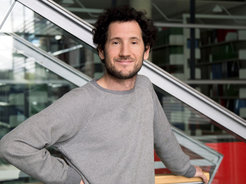Otto Hahn Medal for Jaime Agudo-Canalejo
Jaime Agudo-Canalejo has been awarded with the Otto Hahn Medal from the Max Planck Society (MPG). He will receive the price in the ceremony during the 68th annual meeting of the MPG, which takes place from June 21st -22nd in Weimar, Erfurt and Jena. The society recognizes his outstanding doctoral thesis on the curvature elasticity of fluid membranes.

Dr. Jaime Agudo-Canalejo
The supramolecular architecture of the living cell is based, to a large extent, on fluid membranes that consist of bilayers of lipid molecules. These membranes provide the interfaces between different cellular compartments, and separate the inside from the outside of the cell. The membranes are fluid and extremely thin: their thickness is only about a millionth of a millimeter! As a consequence, the membranes have unusual fluid-elastic properties: they are very flexible and can easily adjust their shape in response to stimuli or changes in their environment. In his doctoral thesis, which Jaime Agudo-Canalejo did at the Max Planck Institute of Colloids and Interfaces in the department of Reinhard Lipowsky, he elucidated the complex morphological behavior of these membranes and significantly advanced the theory of curvature elasticity.
A particularly interesting and important example for membrane remodeling is provided by endocytosis, the process by which small nanoparticles enter human cells. These nanoparticles might be natural viruses that are infecting the cell, or synthetic particles carrying a medical drug, so understanding this process is of high biomedical importance. During endocytosis, the membrane bends around the particle until the particle is completely engulfed: The particle then ends up inside the cell, enclosed by a membrane coat. Using a theoretical model of membrane elasticity, Jaime Agudo obtained a quantitative description of how endocytosis is enhanced or inhibited depending on the size of the particle and on the so-called spontaneous curvature of the membrane, thereby explaining previous experimental observations. The model also provides insight on how to replicate the process of endocytosis in giant vesicles, synthetic membrane systems that mimic the behavior of real cells and provide important modules for synthetic biology. Besides endocytosis, Agudo has studied other membrane remodeling processes, such as the formation of nanotubes in giant vesicles exposed to asymmetric environments; or the formation of narrow membrane necks in biological and biomimetic membranes, which is relevant to essential cellular processes such as cell division or autophagy.
Otto Hahn Medal
The Max Planck Society has honored up to 30 young scientists and researchers each year with the Otto Hahn Medal for outstanding scientific achievements since 1978. The award comes with a monetary sum of 7500 euros as recognition. The prize is intended to motivate especially gifted junior scientists and researchers to pursue a future university or research career. Since 1978, more than 910 scientists and researchers have been awarded the Otto Hahn Medal. The award is presented during the general meeting in the following year.












